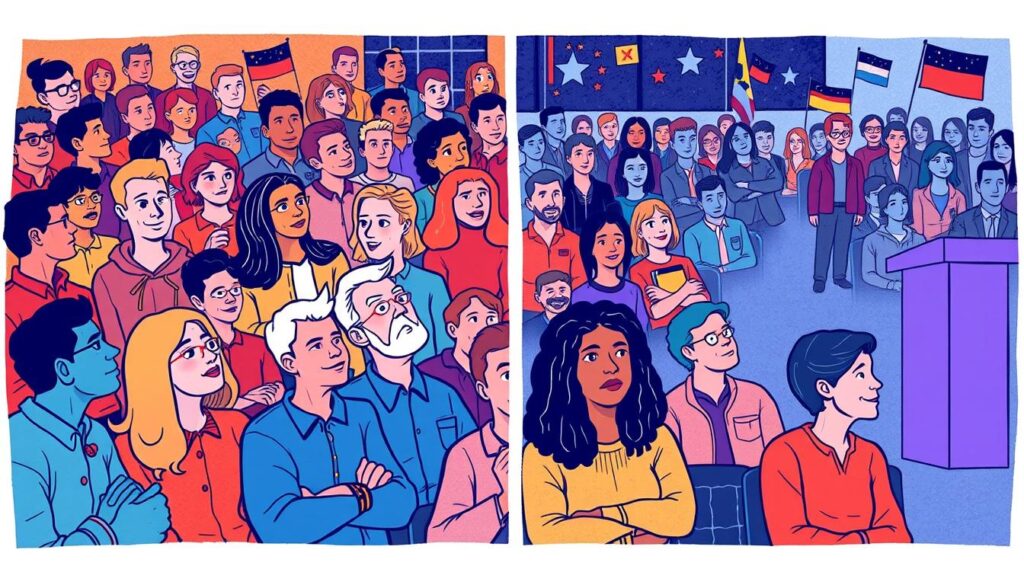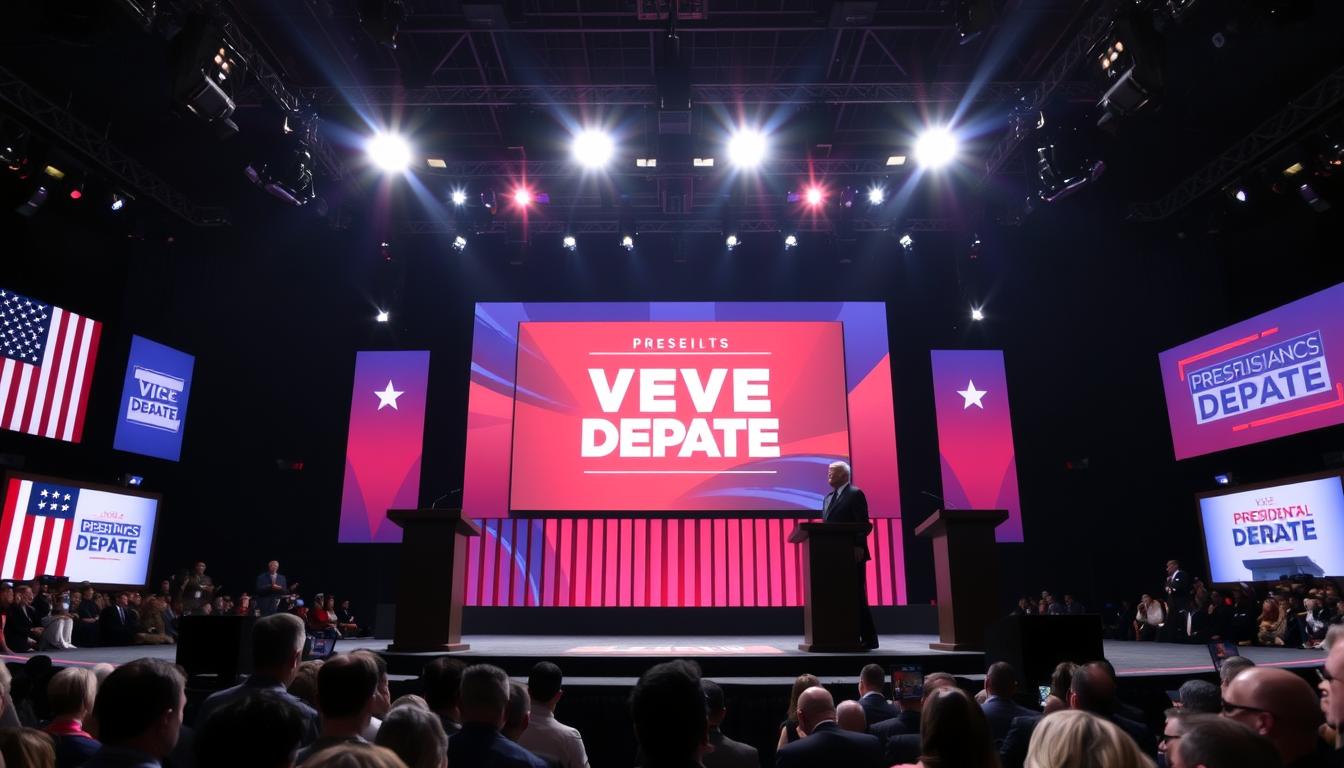The nation watched with bated breath as the vice presidential debate unfolded. It left many uncertain, highlighting the deep divisions in our political landscape. The debate between Republican Senator JD Vance and Democratic Governor Tim Walz ended in a virtual tie. Post-debate polls showed a statistical dead heat between the two candidates.
The 90-minute clash, just five weeks before Election Day, saw the running mates delve into various issues. These included healthcare, immigration, climate change, and the economy. Vance and Walz presented their policy stances with passion, aiming to sway undecided voters. These voters will be crucial in shaping the 2024 presidential race.
Key Takeaways
- The vice presidential debate between Vance and Walz ended in a statistical tie, with post-debate polls showing a virtual dead heat between the candidates.
- The debate covered a wide range of policy issues, including healthcare, immigration, climate change, and the economy.
- Both candidates delivered impassioned performances, with Vance and Walz engaging in substantive and, at times, heated discussions.
- The debate results reflect the deep divisions within the American electorate, with voters split along party lines and demographic lines.
- The debate likely marked the last major event of the 2024 presidential election, setting the stage for the final stretch of the campaign.
Scaramucci’s Critique: Walz Looked “Lost” and “Unfocused”
After the vice presidential debate, Anthony Scaramucci, a former White House communications director, harshly criticized Minnesota Governor Tim Walz. Scaramucci, known for his outspoken views against the former president, described Walz as “lost,” “unfocused,” and “nervous.” His comments highlighted Walz’s performance as lacking in clarity and confidence.
Former Trump Aide Dissects Walz’s Performance
As a former Trump aide, Scaramucci stated that Walz was unprepared for the debate. He noted that Walz’s lack of readiness and focus were evident. Scaramucci believed these shortcomings might have contributed to Senator JD Vance’s stronger showing.
Walz Campaign Defends Governor’s Debate Showing
The Walz campaign countered Scaramucci’s criticism, defending Walz’s performance. They highlighted his experience and qualifications as a potential vice president. The campaign pointed to Walz’s bipartisan achievements and his ability to handle complex issues, suggesting his debate performance was effective in connecting with voters.
| Critic | Assessment | Walz Campaign Response |
|---|---|---|
| Anthony Scaramucci, former Trump aide | Walz appeared “lost,” “unfocused,” and “nervous” during the debate | Walz effectively demonstrated his experience and qualifications as an “experienced governing partner” for Vice President Kamala Harris |
“Walz was not ready for the debate and did not perform well. He looked lost, unfocused, and nervous.”
–Anthony Scaramucci, former Trump communications director
Vance Exceeds Expectations, Softens “Weird” Image
JD Vance, the Republican vice presidential candidate, has seemingly transformed his public image with a stellar debate performance against Tim Walz. The Trump campaign’s team expressed relief at Vance’s calm and composed demeanor. This could mark a significant shift in his campaign, aiming to overcome the “weird” label that has followed him.
Trump Aides Hopeful Vance Reset Narrative
Vance, long seen as “weird,” showed remarkable poise during the debate. He impressed with his grasp of policy and his ability to highlight Democratic vulnerabilities. The Trump campaign is optimistic that Vance’s performance will resonate with voters, potentially altering his public perception.
Vance’s “Human Moment” During Debate
A poignant moment in the debate came when Vance showed empathy towards Walz’s son’s experience with a shooting. This compassionate response was seen as a breakthrough in connecting with voters, softening his “weird” image.
The debate was a pivotal moment for Vance to demonstrate his capabilities and alter the public’s perception of him. With the Trump campaign’s aides hopeful about his prospects, the vice presidential race is now more captivating than ever.
Snap Polls Show Virtual Tie Between Vance and Walz
The vice presidential debate between JD Vance and Tim Walz was a closely watched event. The post-debate snap polls revealed a virtual tie between the two candidates. According to the CBS News poll, 42% of respondents believed Vance won the debate, while 41% saw Walz as the victor. The CNN poll showed a narrow 51% to 49% edge for Vance, and the POLITICO/Focaldata survey resulted in a perfect 50-50 split.
Political analyst Larry Sabato noted that the razor-thin margins in these snap polls reflect the deeply divided nature of the American electorate. The 90-minute debate, which at one point required the moderators to cut the candidates’ microphones due to a heated argument over immigration, was a highly anticipated event in the race for the vice presidency.
| Poll | Vance | Walz |
|---|---|---|
| CBS News | 42% | 41% |
| CNN | 51% | 49% |
| POLITICO/Focaldata | 50% | 50% |
While JD Vance, the Republican candidate, rarely wavered in his responses, Tim Walz, the Democratic candidate, visibly struggled to find his footing initially. However, he became more comfortable as the debate progressed. The close nature of the snap poll results highlights the tight race between the two contenders. It also underscores the significant implications of the vice presidential debate for the outcome of the election.
“As Close as You Can Get”: Razor-Thin Margins Reflect Nation’s Divide
The virtual tie in the vice presidential debate polls mirrors the country’s deep division ahead of the November election. Political analyst Larry Sabato from the University of Virginia Center for Politics notes that the narrow margins between Vance and Walz highlight the entrenched views on both sides of the divided electorate.
The close debate results signal a fiercely contested presidential race. It will likely depend on turnout and the ability to sway a few key voters in swing states. The nation’s political divide is stark, emphasizing the critical role of every vote in the tight presidential race.
“The virtual tie in the vice presidential debate is as close as you can get, and it’s a reflection of just how divided the country is,” said Sabato. “This election is going to come down to turnout and a handful of voters in a handful of states.”
The data clearly shows the country’s partisan split. Vance was favored by voters over 55 and those without college degrees. On the other hand, Walz won over younger voters, college-educated individuals, and minority communities. This demographic divide underscores the deep ideological chasms that have shaped the political landscape in recent years.

As the campaign enters its final stretch, the close debate results and tight presidential race highlight the significance of every vote. The nation’s political divide is evident, and the outcome may depend on which side can mobilize their base and sway undecided voters in key swing states.
Both Candidates See Favorability Boost After Debate
Neither JD Vance nor Tim Walz emerged as clear winners in the vice-presidential debate. Yet, both candidates saw their favorability ratings climb post-debate. Walz’s approval rating jumped from 52% to 60%, while Vance’s favorability surged from 40% to 49%.
Vance’s Surge a “Big Win” for Trump Campaign
Democratic strategist James Carville hailed Vance’s favorability increase as a significant victory for the trump campaign. Despite not winning the debate outright, Vance’s ratings saw a notable rise. This improvement made him appear more relatable and human to voters.
The debate impact on ratings was evident, with both Vance and Walz gaining favor among voters. Vance’s vance favorability surge could be a crucial boost for the trump campaign as the election draws near.
| Candidate | Pre-Debate Favorability | Post-Debate Favorability | Favorability Increase |
|---|---|---|---|
| JD Vance | 40% | 49% | 9% |
| Tim Walz | 52% | 60% | 8% |
“Vance’s favorability boost, especially given his historically low numbers, is a big win for the Trump campaign, even if he didn’t clearly win the debate itself.”
– James Carville, Democratic Strategist
Demographic Splits in Voter Perceptions
Post-debate polls showed significant demographic splits in voter opinions. JD Vance, the Republican nominee, excelled with voters over 55. In contrast, Tim Walz, the Democratic contender, garnered stronger support from younger voters, especially those aged 25-34. Walz also led among college-educated voters, while Vance performed better with those without a college degree.
Walz’s support was higher among Black and Latino voters, while Vance fared better with white voters. The POLITICO/Focaldata poll revealed Walz’s 58-42 lead among independent voters who watched the debate.
Age, Education, and Race Impact Debate Views
The data indicates that age, education, and race were crucial in shaping voter opinions of the debate. These demographic factors contributed to the partisan divide in evaluating the candidates’ performances.
| Demographic Group | Vance Supporters | Walz Supporters |
|---|---|---|
| Age 25-34 | 42% | 58% |
| Age 55+ | 58% | 42% |
| College Degree | 40% | 60% |
| No College Degree | 55% | 45% |
| White Voters | 53% | 47% |
| Black/Latino Voters | 35% | 65% |
| Independent Voters | 42% | 58% |
The demographic splits in voter perceptions of the debate underscore the age, education, and race impact on the partisan divide surrounding the vice-presidential candidates’ performances.

who won the vp debate tonight? Social Media Reacts
The vice presidential debate between JD Vance and Governor Tim Walz ignited a firestorm on social media. Supporters of both candidates claimed victory, highlighting their candidate’s strengths. Conservatives lauded Vance’s focus and preparation, while progressives saw Walz as the ideal vice president.
Political analysts noted that both sides could claim victory. Vance exceeded expectations, while Walz effectively addressed key issues. The debate showcased a stark divide in social media opinions.
- Fox & Friends co-host conducted impromptu polls with Michigan voters regarding the 2024 presidential election, with the majority of diner-goers raising their hands when asked if they were “worse off” under the current administration.
- Republican audience approval surged past 80% during JD Vance’s explanation of his support for Donald Trump, while Democratic viewers expressed discontent, with ratings falling below 40% and dipping near 20% during Vance’s statement.
- Independent voters’ reactions to Vance’s segment ranged between 40% and 60% approval.
Reactions to Governor Tim Walz’s stance on abortion were mixed. Republican viewers disapproved significantly, while independents and Democrats remained mostly approving.
“Donald Trump Jr. described the debate as a ‘blowout’ for JD Vance, while Vice President Harris’s campaign praised Governor Tim Walz’s performance after the debate.”
The 2024 election cycle is intensifying, with the vice presidential debate becoming a crucial battleground. Both candidates and their campaigns are vying for voter support and shaping the narrative on social media.
Key Moments: 2020 Election, Immigration, Healthcare
The vice presidential debate between Tim Walz and JD Vance was highly anticipated but lacked major viral moments or gaffes. However, several exchanges stood out, highlighting key policy differences. One notable moment was when Walz asked Vance if he believed Donald Trump lost the 2020 election. Vance’s response, described by Walz as a “damning non-answer,” sparked significant discussion.
Vance also attacked Vice President Kamala Harris on border security, claiming Donald Trump had “saved Obamacare.” This claim was quickly debunked by experts. The debate covered various topics, including the Affordable Care Act, housing prices, and energy policy, trade, and climate change.
Vance’s “Damning Non-Answer” on 2020 Election
When Walz inquired if Vance believed the 2020 presidential election was “stolen” from Donald Trump, Vance’s response was deemed evasive. This exchange brought to the forefront the ongoing debate on the 2020 election’s legitimacy. It’s a crucial issue for many Republican candidates in the 2022 midterm elections.
“Walz pressed Vance on whether he believed Donald Trump lost the 2020 election, to which Vance gave what Walz called a ‘damning non-answer.'”
Vance made several misleading claims about the Harris administration’s immigration and healthcare policies. These were promptly fact-checked and refuted by experts. These moments highlight the critical need for voters to scrutinize candidate statements and seek reliable information on key issues.
Civility Stands Out Amid Divisive Political Landscape
In today’s world, where politics often turns sour, the vice presidential debate between Kamala Harris and Donald Trump was a breath of fresh air. Unlike the heated presidential debate, Harris and Trump kept their tone respectful. They focused on real policy issues, steering clear of personal attacks.
A CBS/YouGov poll found that 88% of viewers saw the debate as “generally positive.” This stands in stark contrast to the usual harshness seen in political debates. Despite their clear policy differences, the debate’s civility offered a beacon of hope in our divided world.
Yet, political scientist Lilliana Mason warns against overemphasizing the debate’s civility. She points out that it might hide the real, significant differences between the two candidates. “Policy discussions on healthcare, immigration, and the economy were robust,” she noted. “The candidates’ differing visions for the country were clearly laid out.”
| Key Moments | Highlights |
|---|---|
| 2020 Election | Trump avoided directly answering whether he would challenge the 2024 election results, shifting focus to issues of censorship and endorsements. |
| Immigration | The debate highlighted the ongoing controversy surrounding Trump’s false claims about Haitian migrants in Springfield, Ohio, with Harris emphasizing the importance of finding solutions and avoiding dehumanization. |
| Healthcare | Policy discussions included healthcare, housing, child care costs, climate change, and abortion laws, showcasing a more policy-focused approach. |
The vice presidential debate showed that respectful and constructive political discourse is possible, even with deep ideological differences. As our nation struggles with polarization, Harris and Trump’s example could guide future debates. It emphasizes the value of debate civility, a respectful tone, and a focus on policy discussion over personal political discourse.
Campaigns Spin Debate Performance, Prepare for Final Stretch
The vice presidential debate concluded, and both campaigns swiftly declared victory. The Trump campaign praised JD Vance’s performance, calling it “dominating.” Meanwhile, the Harris campaign highlighted Tim Walz’s grasp of national challenges.
Political scientist Mitchell McKinney pointed out that the debate won’t drastically change the race’s direction. Yet, it offers voters a clearer view of the choices they’ll make in November. Now, the campaigns focus on the election’s final days, aiming to leverage the debate’s momentum.
Trump, Harris Teams Claim Victory for Their Candidates
The Trump campaign swiftly declared JD Vance the debate’s winner. They commended his empathetic and smooth performance. They emphasized Vance’s ability to connect with voters through his personal struggles with poverty.
The Harris campaign, however, defended Tim Walz’s showing, saying he clearly understood national issues. They highlighted Walz’s stance on abortion rights and the effects of bans, resonating with viewers.
Despite differing claims of victory, the debate’s impact on the race is minimal. Yet, it highlights the significant policy differences between the parties. These differences are crucial on issues like immigration, abortion, and foreign policy.

With the final stretch in sight, Vance and Walz will engage in various events to connect with voters. The upcoming Harris-Trump showdown will be pivotal, with both sides aiming to gain an advantage in the election’s final days.
All Eyes on Upcoming Harris-Trump Showdown
With the vice presidential debate behind us, all eyes are now on the presidential showdown. President Kamala Harris and former President Donald Trump will face off in their second and final debate on October 15th in Miami, Florida. As the 2024 campaign enters its final month, polls indicate a tight race. Harris leads Trump by just 1.8 percentage points nationally. Political analyst Amy Walter emphasizes that every moment from now on could be crucial in this tight race.
The upcoming Harris vs. Trump debate marks the final presidential debate before the November 5th election. It’s a critical event in the 2024 election cycle. Both candidates will face immense pressure to sway undecided voters and solidify their base support. Given the nation’s deep divisions, the debate will be closely watched and analyzed. Americans will seek clarity on each candidate’s vision for the country’s future.
Strategists from both sides are busy preparing their candidates for this high-stakes showdown. The debate format and moderators have yet to be announced. However, it’s certain that the two seasoned politicians will engage in a spirited exchange on various issues. The economy, foreign policy, and social issues will likely be at the forefront. As the 2024 election nears its end, the Harris-Trump debate will undoubtedly be a pivotal moment, shaping the race’s outcome.
